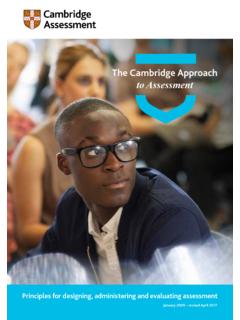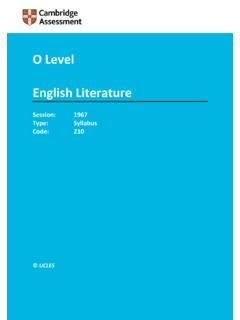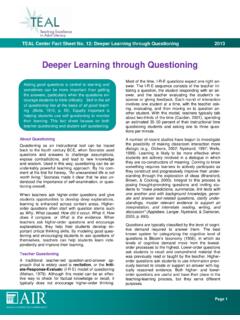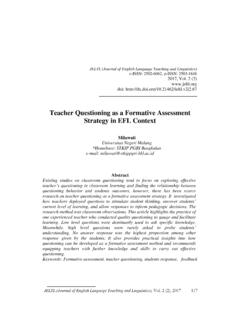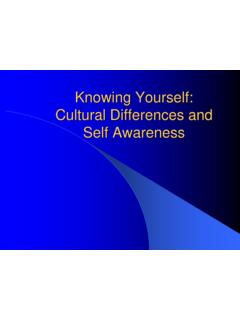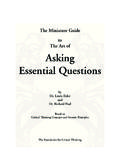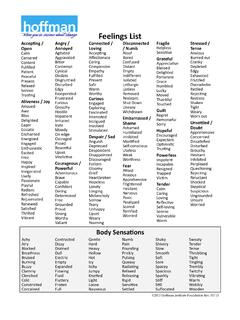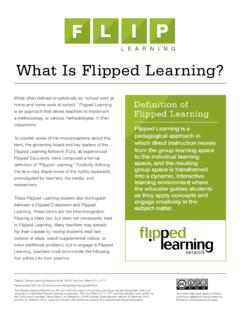Transcription of The curriculum and the entitlement to knowledge Michael ...
1 The curriculum and the entitlement to knowledge (This is a slightly edited text of a talk given at a seminar organised by Cambridge Assessment Network on Tuesday 25 March 2014, Magdalene College, Cambridge.). Michael Young Institute of Education, University of London Introduction In this talk I will explore the idea that exploring the idea that the curriculum of schools (but in principle of any educational institution) should be an entitlement to powerful knowledge . This requires a clarification of both concepts. To do this I shall (i) make reference to the concept of powerful knowledge '1 as a curriculum principle, (ii) distinguish between (a) the entitlement to powerful knowledge ' and the entitlement to knowledge for all', (b) a National curriculum and a school curriculum (2), and (c) the concepts of curriculum and pedagogy(2).
2 Despite our hosts this evening being a leading Examination Board, I will treat the topic of assessment, apart from a few initial comments, as outside my brief. Assessment: a brief note All the likely pressures on schools in the future will be for the assessment system to drive both curriculum and pedagogy, and this must be resisted by all partners- government, exam Boards and schools in whatever ways they can. This is not to say we do not need assessment to ensure that the curriculum is an entitlement to knowledge . In the English school system we have a long history of no National curriculum ; school examinations operated in effect as a National curriculum prior to 1988. Furthermore, from the point of view of my argument (with some exceptions, for example, many girls being denied the opportunity to study the physical sciences), examinations did a better curriculum job than any of our subsequent versions of a National curriculum .
3 They gave considerable autonomy to schools and enabled the universities to play a major role in setting and examining syllabuses and maintaining standards. The problems arose when the system expanded from the 1960's, and after with the attempts to shift from a norm- referenced to a criterion-referenced system. Like other innovations- Assessment for Learning is a good example, criterion referencing began as a good idea but lost control of its own development as a consequence of over-specification- an example of what the great sociologist Max Weber argued was happening to rationality and bureaucracy. The close link between schools and university subject specialists that was a feature of the old system was gradually weakened as the QCDA and its predecessors were allowed to extend their remit.
4 This is one of the reasons that I. welcome the current Secretary of State's proposal that universities should re-invent the school examining role that they had since the 19th century. Its great strength was that it kept those who teach undergraduates in close touch with teachers preparing future undergraduates. With 130 or more universities today, this will be no straightforward task and it may call for a re-organisation of the various groups that bring some universities together and keep others apart. The educational and political challenges to knowledge The central role of knowledge in education has undoubtedly declined over the years despite the claims that more and more occupations will be for graduates. This is partly explained by the decisions to expand opportunities for higher education but without any parallel expansion of resources, I will therefore start by identifying two kinds of trends which challenge the idea that education should be an entitlement to knowledge ; I will refer to them as the educational challenge and the political challenge.
5 While we need to remember the political challenge which comes from the government and the wider society, our primary responsibility as those who work in or are involved in the education system is to limit or even reverse the attacks on knowledge that come from within. It such attacks therefore and the different ways that they are expressed that I shall give most of my attention to in this talk. They are located within the educational community but also associated with the policies of the pre 2010 governments, Labour and Conservative but especially the pre 2010 Labour governments. If your prime minister thinks our 1 and (2013) On the powers of powerful knowledge , Review of Education, Volume 1 No 3, December 2013. 2 (2013) Overcoming the crisis in curriculum studies: a knowledge based approach, Journal of curriculum Studies, vol 45: No 2, 101-118.
6 1. education policy is the best economic policy, we have, as Tony Blair said on a number of occasions, this is hardly surprising-responding to the assumed needs of the economy will never lead to a knowledge -led curriculum . These educational attacks on knowledge and their emphasis, for example, on generic skills was largely implicit until the election of the coalition government in 2010 . A skepticism about knowledge was alive in the abstract and esoteric debates within cultural studies and the social sciences and their endlessly assertions that there is no such thing as objective knowledge '; furthermore they have become a growing feature of much educational studies often spilling over via my own discipline, the sociology of education.
7 All knowledge is situated knowledge , reflecting the position of the producer or knower, at a certain historical moment in a given cultural context.. This is how the American philosopher Kathleen Lennon puts it, but hers is in no way an exceptional assertion. If all knowledge is situated, this leads to a relativism which rejects the assumption of their being better' knowledge in any field that could or should underpin the curriculum . As a consequence, the curriculum becomes open to a whole range of purposes other than the acquisition of knowledge . Perhaps the most significant but least discussed is the argument that there is no knowledge important enough that it should take precedence over the assumptions about student motivation, interest or performance3.
8 I shall illustrate this claim with some historical examples. However, the sea change in attitudes to knowledge that came with the election of the Coalition Government is worth mentioning first. After 2010, the skepticism about knowledge that had characterised many in the educational community was faced with an open and explicit alternative- the present government's proposals for the National curriculum , their new emphasis on subject knowledge and their plans for revising examinations. It was then that the skepticism about knowledge within the educational community became a series of attacks that were explicit, political and inextricably related to opposition to government policies in general. This is well illustrated in newspaper columns of distinguished journalists and former Secretaries of State and various letters to the national press from leading teacher educators.
9 I shall draw on two kinds of arguments to illustrate my case about the attack on knowledge ', one is loosely historical and one more personal and subjective. The former will trace this skepticism about knowledge back to the curriculum reforms of the 1970's and take us up to 2010;. however, the policies of the coalition government had their roots in the work of the Think Thanks such as Civitas, Politeia and Reform which advised the Conservative Party before the Election. I shall then present some personal reflections on the extent to which what some have called a fear of knowledge ' has come to pervade much thinking in the educational community and more broadly the thinking of those on the Left involved in education both are groups that one might have expected to defend the entitlement to knowledge as a right of all pupils.
10 This section will be personal rather than formally researched for a particular reason. I came in to the debates about the curriculum from the sociology of education 4. However, nothing prepared me for the level and intensity of opposition to the idea of a knowledge -led curriculum from those on the Left; it was invariably associated with the policies introduced by Michael Gove. I am no Gove supporter- far from it but he has opened up the debate about the curriculum that was not even hinted at before, even by the launch of the National curriculum in 1988. What especially disturbing is the extent that the debate becomes almost ad hominem with the attacks not on the policy but that it is some kind of personal project of the Secretary of State.
